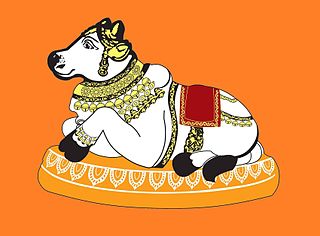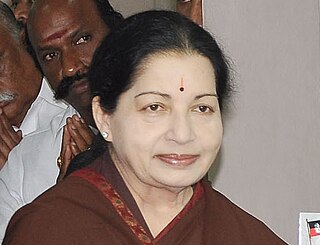
Tamil Nadu is one of the 29 states of India. Its capital and largest city is Chennai. Tamil Nadu lies in the southernmost part of the Indian subcontinent and is bordered by the union territory of Puducherry and the South Indian states of Kerala, Karnataka, and Andhra Pradesh. It is bounded by the Eastern Ghats on the north, by the Nilgiri Mountains, the Meghamalai Hills, and Kerala on the west, by the Bay of Bengal in the east, by the Gulf of Mannar and the Palk Strait on the southeast, and by the Indian Ocean on the south. The state shares a maritime border with the nation of Sri Lanka.

Chennai, is the capital of the Indian state of Tamil Nadu. Located on the Coromandel Coast off the Bay of Bengal, it is the biggest cultural, economic and educational centre of south India. According to the 2011 Indian census, it is the sixth most populous city and fourth-most populous urban agglomeration in India. The city together with the adjoining regions constitute the Chennai Metropolitan Area, which is the 36th-largest urban area by population in the world. Chennai is among the most visited Indian cities by foreign tourists. It was ranked the 43rd most visited city in the world for the year 2015. The Quality of Living Survey rated Chennai as the safest city in India. Chennai attracts 45 percent of health tourists visiting India, and 30 to 40 percent of domestic health tourists. As such, it is termed "India's health capital". As a growing metropolitan city in a developing country, Chennai confronts substantial pollution and other logistical and socio-economic problems.

Madurai is one of the major cities in the Indian State of Tamil Nadu. It is the cultural capital of Tamil Nadu and the administrative headquarters of Madurai District, the third largest city in Tamil Nadu and 25th most populated city in India. Located on the banks of River Vaigai, Madurai has been a major settlement for two millennia.

Coimbatore, also known as Kovai and Coyamuthur, is a major city in the Indian state of Tamil Nadu. It is located on the banks of the Noyyal River and surrounded by the Western Ghats. Coimbatore is the second largest city by area and population in Tamilnadu after Chennai and the 16th largest urban agglomeration in India. It is administered by the Coimbatore Municipal Corporation and is the administrative capital of Coimbatore district.

The Tamil people, also known as Tamilar, Tamilans or simply Tamils, are an ethnic group who speak the language Tamil as their mother tongue and trace their ancestry to Southern India and North-eastern Sri Lanka. Tamils, with a population of around 76 million and with a documented history stretching back over 2,000 years, are one of the largest and oldest extant ethnolinguistic groups in the modern world. Tamils constitute 5.9% of the population in India, 15.3% in Sri Lanka, 6% in Mauritius, 7% in Malaysia and 5% in Singapore.
Iyer is a caste of Hindu Brahmin communities of Tamil origin. Most Iyers are followers of the Advaita philosophy propounded by Adi Shankara. The majority reside in Tamil Nadu, India.

Rameswaram, is a town and a second grade municipality in the Ramanathapuram district in the South Indian state of Tamil Nadu. It is on Pamban Island separated from mainland India by the Pamban channel and is about 40 kilometres from Mannar Island, Sri Lanka. It is in the Gulf of Mannar, at the tip of the Indian peninsula. Pamban Island, also known as Rameswaram Island, is connected to mainland India by the Pamban Bridge. Rameswaram is the terminus of the railway line from Chennai and Madurai. Together with Varanasi, it is considered to be one of the holiest places in India to Hindus, and part of the Char Dham pilgrimage.
Hindu refers to an identity associated with the philosophical, religious and cultural systems that are indigenous to the Indian subcontinent.

Kambar was a medieval Tamil Hindu poet and the author of the Ramavataram, popularly known as Kambaramayanam, the Tamil version of the epic Ramayana. Kambar also authored other literary works in Tamil, such as Thirukkai Vazakkam, Erezhupathu, Silaiezhupathu, Kangai Puranam, Sadagopar Anthathi and Saraswati Anthathi.

Villupuram Chinnaiya Manrayar Ganesamoorthy, known by his stage name Sivaji Ganesan, was an Indian actor, producer and composer. Considered to be one of the greatest actors in Indian cinema, he was active in Tamil cinema during the latter half of the 20th century. His acting and dialogue delivery skills is still viewed as one of the greatest in Indian Cinema history. He was well known for his versatility and variety of roles depicted on screen, which gave him also the Tamil honorific name Nadigar Thilagam. In a career that spanned close to five decades, he had acted 288 films in Tamil, Telugu, Kannada, Malayalam and Hindi. His eidetic memory helped him remember his scripts at a glance.
The Tamil calendar is a sidereal Hindu calendar used by the Tamil people of the Indian subcontinent. It is also used in Puducherry, and by the Tamil population in Malaysia, Singapore, Mauritius and Sri Lanka. Tamil Nadu farmers greatly refer to this. It is used today for cultural, religious and agricultural events, with the Gregorian calendar largely used for official purposes both within and outside India. The Tamil calendar is based on the classical Hindu solar calendar also used in Assam, West Bengal, Kerala, Manipur, Nepal, Odisha, Rajasthan and Punjab.

Popularly called the "Gateway to the South India", Chennai culture is distinctly different from that of any other city in India. Being a cosmopolitan city; the culture of the city reflects its diverse population which has resulted in a unique blend. Though a modern city, it continues to be traditional and conventional in certain ways. Traditional music, dance and all other art forms of Tamil Nadu are very popular in the city. One can find a unique blend of culture from traditional foods to fast foods, from ancient temple architecture to modern high-rises and from classical music and dance to the growing nightlife in the city.

Hinduism has a long tradition and which is the oldest religion in Sri Lanka. More than 2000 years civilization have proved so far from Hindu temples in Sri Lanka. Hindus currently make up 12.60% of the Sri Lankan population, and are almost exclusively Tamils apart from small immigrant communities from India and Pakistan such as the Sindhis, Telugus and Malayalees. In the 1915 census they made up almost 25% of the population, which included the indentured labourers the British had brought. Due to emigration, today they are still a sizeable minority. Hinduism is dominant in the North and Eastern provinces, where there are predominantly Tamil people. Hinduism is also practised in the central regions as well as in the capital, Colombo. According to the government census of 2011, there are 2,554,606 Hindus in Sri Lanka constituting 12.6% of the country's population. During the Sri Lankan Civil War, many Tamils fled to other countries. There are Hindu temples abroad which were built by the Sri Lankan Tamil diaspora to maintain their religion, tradition and culture.
Hinduism in South India refers to the Hindu culture of the people of South India. The Hinduism in South India is characterized by Dravidian customs and traditions. The Dravidians made great contributions to development of Hinduism. South India was the birthplace of many Hindu saints and reformers. The Brahmins of ancient South India were classified as Pancha-Dravida. The Hindus in South India are followers of various Hindu branches such as Shaivism, Vaishnavism, Shaktism, Brahmanism and others. Hinduism was the state religion of most of the South Indian kingdoms. During the Ancient and Middle Ages were built in South India one of the greatest Hindu temples. South Indian kings such as the Cholas spread Hinduism overseas to parts of Southeast Asia. The activities of South India across the Palk Strait led to survival of Hinduism in Sri Lanka. The Tamil Hindus in Sri Lanka are followers of Tamil Shaiva Siddhanta, which is mainly practiced in parts of South India. Some Hindu festivals are celebrated mostly or exclusively in South India and Sri Lanka. In South India are also numerous Hindu pilgrimage site that is visited annually by thousands of devotees. The Tirumala Venkateswara Temple in Andhra Pradesh is considered to be the most-visited holy place in the world. The Cauvery river that flows through Karnataka and Tamil Nadu is also known as the "Ganges of South" and is one of the most sacred river of the Hindus.

Vetri Maaran is an Indian film director, screenwriter, and film producer, who works in the Tamil film industry. As of 2016, he has won four National Film Awards and one Filmfare Award.

The tenth legislative assembly election of Tamil Nadu was held on 24 June 1991. The Anna Dravida Munnetra Kazhagam (ADMK) – Indian National Congress (INC) alliance won the elections in a landslide and ADMK leader J. Jayalalithaa became the chief minister. This was her first term in office. The united strength of ADMK, the alliance with the Congress and the wave of public sympathy in the wake of Rajiv Gandhi assassination combined together to produce a massive victory for the ADMK. The M. Karunanidhi led Dravida Munnetra Kazhagam (DMK) was hurt by the public perception that it had close ties with LTTE and was routed in the elections winning only 2 out of the 234 seats.

The 2013 Anti–Sri Lanka protests are a series of student protests and agitations initiated by the Students Federation for Freedom of Tamil Eelam in Tamil Nadu, India, against war crimes committed against Sri Lankan Tamil people by Sri Lankan army during the Eelam War IV. The protesters demanded that the Government of India vote in support of a United Nations Human Rights Council (UNHRC) resolution censuring the Government of Sri Lanka for war crimes. Some radical groups even demanded the prosecution of the President of Sri Lanka, Mahinda Rajapakse for his role in the alleged genocide of Sri Lankan Tamils. Apart from college students, doctors, film personalities and employees of IT companies also participated in the protests.

The Tamil Nadu Legislative Assembly election was held on 16 May 2016 for the 232 seats of the Legislative Assembly in the state of Tamil Nadu in India. AIADMK under J. Jayalalithaa won the elections and became the first ruling party to be re-elected in Tamil Nadu since 1984, though with a reduced majority. DMK won half of the seats it contested but its allies performed poorly; notably, the Indian National Congress won 16% of the seats they contested and the alliance lost due to its poor performance. The votes were counted on 19 May 2016. In the previous election in 2011, AIADMK, under the leadership of Jayalalithaa, won a simple majority and formed the government, while DMDK chief Vijayakanth served as the Leader of Opposition until January 2016. This is the last election Jayalalitha and Karunanidhi contested as they both died in office later.
















